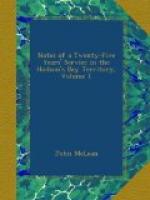It was about noon when they began their flight. One of them reached Moose Factory next day about noon, the other soon after. The distance—nearly sixty miles—travelled in so short a space of time, may appear incredible; but fear gave them wings, they fled for their lives and never halted. One of them, my informant, lost all the toes of one of his feet by the frost.
Measures were immediately adopted to frustrate the further diabolical designs of the Indians, as well as to avenge the innocent blood that had been shed. Messengers were despatched with all possible haste to Rupert’s house, the nearest post, to give the alarm, and a party of men, under an efficient leader, was sent to seize the murderers. This expedition, however, proved unsuccessful, as the Indians could not be found in that direction; but, in the meantime, two of them who had come to Rupert’s house to “spy the land,” were seized and sent bound to Moose Factory, and one of them was compelled to act as guide to another party. Led by him, they approached the camp without being perceived, and found the “man of medicine” sitting very composedly in his tent, surrounded by the spoils he had taken from the fort. He was secured, and the rest of his associates, who were absent hunting, were soon “tracked,” and secured likewise. They then all underwent the punishment they deserved.
The fort presented a horrible spectacle. Men, women, and children shared the same fate, and the mangled limbs of their victims were scattered among the articles of property which the wretches, not being able to carry off with them, had attempted to destroy.
CHAPTER XIV.
FALL THROUGH THE ICE—DANGEROUS ADVENTURE AT A RAPID—OPPONENTS GIVE IN—ORDERED TO LA CHINE—TREATMENT ON MY ARRIVAL—MANNERS, HABITS, AND SUPERSTITIONS OF THE INDIANS—FEROCIOUS REVENGE OF A SUPPOSED INJURY—DIFFERENT METHODS OF THE ROMAN CATHOLIC AND PROTESTANT MISSIONARY—INDIAN COUNCILS—TRADITION OF THE FLOOD—BEAVER-HUNTING— LANGUAGE.
Finding that my presence was more wanted at the outpost than elsewhere, I resolved on taking up my residence there for the winter 1831-32. Our active opponent gave us much annoyance, causing great expense to the Company, without any benefit to himself; on the contrary, it ultimately ruined him.




